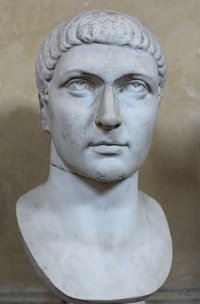The Council of Nicea and the Nicene Era
The Nicene Era, named after the Council of Nicea in A.D. 325, is very possibly the most important era of Christian history.
Though it encompasses only a short time
period—from perhaps A.D. 303 and the start of the Great Persecution to
around A.D. 381 and the Council of Constantinople—the events of the Nicene Era were earth-shaking, affecting not only Christianity but the history of the western world and the Middle East.
The Great Persecution and the Rise of Constantine
The Nicene Era begins with the Great Persecution in in A.D. 303. It lasted until it was called off by Galerius in A.D. 311.
Bust of Constantine the Great

Constantine the Great was "converted" (in a sense) by his famous
vision as he prepared for battle with Maxentius, his rival emperor in
the west. While Constantine would not count himself a Christian until
his baptism on his deathbed in A.D. 337, he did grant Christianity a
favor and an influence in government that it had never before
experienced.
It would prove the end of Christianity as it was known before Nicea.
The Arian Controversy
A disagreement between a bishop and one of his elders in Alexandria in A.D. 318 led to a controversy that threatened to split the empire as well as the Church.The emperor sought to save his empire by convening a council in Nicaea, in modern-day Turkey. Every bishop in the empire was invited to the Council of Nicea, and estimates vary from 250 to 318 bishops that were in attendance.
The Council of Nicea and the Doctrine of the Trinity
The Council of Nicea drew up a creed based on the Rule of Faith of the church in Caesarea. The Nicene Creed not only confirmed the ancient view of the Trinity held by the Church, but it specifically refuted and condemned Arianism. [The Apostles Creed is a similar modern version of the Nicene Creed.The biggest controversy of Nicea concerned the word homoousios or "one substance," the one addition—besides the anathemas—that the council made to Caesarea's rule of faith.
The anathemas, a word that means condemnation or curse, were added to the end of the Creed to specifically put an end to Arianism.
Unfortunately, it didn't work.
The Fall of the Church
The fall of the church—which I like to call The Great Judo Throw—was a great fall. At one point,"Christians" in Constantinople, still arguing over Arianism even after the Council of Nicaea, beat each other to death until the well overflowed with blood and ran into the streets.Perhaps Christians were just bored with their new-found comfort under Constantine. It is apparent that when the majority of the Roman empire turned to Christianity, they did not also turn to Christ and become Christians. Christians possess the Spirit of God (Rom. 8:9).
Prior to Constantine, early church bishops were not paid. They were supported with the widows. After Constantine, not only did they receive a salary, but there was much prestige and power associated with the office of bishop.
Obviously, the men who filled the role before Nicea were different sort of men than those that would fill the role afterwards.
There is no doubting how thorough the fall of the Church was. The histories before and after the Nicene Era cannot be compared to one another.
Eusebius wrote a history in A.D. 323, two years prior to Nicea, that spoke of the expansion of the churches, great men of God, defending the faith against heresies, and the righteousness of the saints. In A.D. 440, Socrates Scholasticus took up his history where Eusebius left off, reporting controversies, intrigues, suspicions, and even violence and murder.
No comments:
Post a Comment